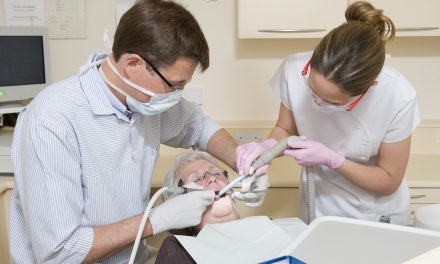A career as a dental assistant can offer stability, a variety of tasks, and opportunities for growth. Dental assistants play a crucial role in dental practices, often managing responsibilities such as patient care, office administration, and aiding dentists during procedures. They provide essential support in ensuring patient comfort and maintaining efficient practice operations.

Individuals interested in this field typically need to complete a certification program or an associate degree in dental assisting. This education helps them learn about dental procedures, patient care, and dental office management. Successful dental assistants often possess strong communication skills, attention to detail, and the ability to work well in a team.
The work environment for dental assistants is usually clean and professional, often within private dental offices, hospitals, or clinics. Those pursuing this career can expect varied tasks and a dynamic work setting. With experience, dental assistants may advance to positions such as lead assistant or office manager, and they often enjoy a steady demand for their skills, given the positive job market outlook.
Key Takeaways
- Dental assistants are vital in dental practices.
- Education in dental assisting is typically required.
- Career growth and varied tasks are common.
Role and Responsibilities
Dental assistants play a crucial role in ensuring dental procedures run smoothly. Their responsibilities focus on direct support to the dentist, ensuring patient comfort, and maintaining a safe and organized work environment.
Assisting with Dental Procedures
Dental assistants are key players during dental procedures. They provide dentists with the necessary tools and materials. This support requires excellent organizational skills to ensure everything is available when needed. They may also take dental impressions or apply sealants, depending on their level of training. Their role during procedures includes making patients feel comfortable and informed about what is happening.
Patient Care and Interaction
Interacting with patients is a significant part of a dental assistant’s job. They often greet and prepare patients for treatment, making sure they understand the procedure. They might also provide post-treatment care instructions. Their interpersonal skills are essential in creating a welcoming environment and addressing any concerns patients might have about their treatment.
Infection Control and Sterilization
Infection control is critical in any dental practice. Dental assistants are responsible for sterilizing instruments and disinfecting surfaces to maintain a hygienic work area. They must follow strict protocols to prevent the spread of infections. This includes wearing protective gear and ensuring that all equipment is properly sanitized after each use, reflecting their essential role in patient safety.
Dental Records Management
Managing patient records is another responsibility of dental assistants. They update and organize files, ensuring that patient information is accurate and easily accessible. This task requires confidentiality and attention to detail, as they handle sensitive information like medical history and treatment plans. Accurate record-keeping supports smooth operations and enhances patient care.
Educational Requirements
Dental assistants need specific training and credentials to work effectively. These requirements vary depending on the location and the desired level of expertise. Many states require formal education and certification to ensure competence.
Dental Assistant Programs
To become a dental assistant, individuals often enroll in dental assistant programs offered by community colleges, vocational schools, or technical institutes. These programs typically last about one year and cover both theoretical and practical aspects of dental care. Coursework includes subjects like dental anatomy, radiology, and infection control. Some programs offer an associate degree, which provides further education in areas relevant to dental care. Hands-on training in a dental setting is usually incorporated into the curriculum, allowing students to gain practical experience before entering the workforce.
Certifications and Licenses
Certifications and licenses are often needed to practice as a dental assistant. In the U.S., the Dental Assisting National Board (DANB) offers certification exams, such as the Certified Dental Assistant (CDA) exam. Many states recognize this certification, though requirements can differ by state. Some states have specific rules regarding what a dental assistant can do, so obtaining a license or certification may be needed for tasks like taking X-rays. Keeping certification updated through continuing education is also typical, ensuring that dental assistants stay current with industry standards and practices.
Skills and Qualities
Dental assistants play a crucial role in ensuring the smooth operation of dental offices. They need to possess several key skills, including effective communication, keen attention to detail, and excellent dexterity.
Communication Skills
Effective communication skills are vital for dental assistants. They must interact with patients to explain procedures and provide reassurance. Clear communication ensures patients understand what to expect, reducing anxiety.
Additionally, dental assistants work closely with dentists and other staff. They need to convey patient information accurately, ensuring the team collaborates efficiently.
Understanding instructions from dentists and relaying them accurately is essential. Miscommunication can lead to mistakes, impacting patient care. Moreover, being bilingual or multilingual can be beneficial in diverse communities.
Attention to Detail
Attention to detail is critical in this role. Dental assistants prepare equipment and workspace meticulously. Missing even small details can lead to delays or complications during procedures.
They must also maintain accurate records. This includes patient histories and treatment data, which must be recorded precisely. Errors in records can affect patient outcomes and may lead to legal issues.
Furthermore, dental assistants ensure sterile environments. They must consistently follow hygiene protocols to prevent infections. This focus on detail is vital in maintaining patient safety and high standards in the dental practice.
Dexterity and Coordination
Dental procedures often require dexterity and coordination. Dental assistants need steady hands to assist with tools and equipment. Minor tremors or errors can impact the quality of work.
Tasks involving small instruments and delicate procedures demand a high level of precision. Excellent hand-eye coordination enhances efficiency and reduces risks, supporting smoother operations.
As part of their role, dental assistants often need to stand for extended periods while maintaining control over tools. This physical endurance aids in completing tasks effectively, ensuring the dentist can perform without interruptions or mistakes.
Work Environment
Dental assistants play an important role in creating a positive experience for patients. They work closely with dentists and dental hygienists in various locations and settings.
Dental Offices and Clinics
Dental assistants typically work in dental offices or clinics, providing support to dentists and ensuring smooth operations. The environment can be fast-paced, especially in busy practices. Assistants help with tasks like preparing treatment rooms, sterilizing instruments, and updating patient records.
The work area is usually clean and organized, focused on maintaining a sterile setting. Interaction with patients is regular, requiring good communication skills. Occasionally, they might assist in surgeries or handle emergency situations, which demands quick thinking and calmness.
Work Schedule
The work schedule for dental assistants usually follows regular office hours. Most dental offices operate during weekdays, but some may open on weekends or evenings to accommodate patients. This means assistants might have to adjust to different schedules, depending on the clinic.
Full-time positions are common, though part-time opportunities exist too. Those in full-time roles can expect to work around 35 to 40 hours per week. Flexibility is key, as some situations might require longer hours to meet patient needs.
Overall, the work environment is structured yet dynamic, offering a balance between routine and varied tasks.
Career Progression
Career progression for dental assistants offers various paths, including advancing to roles like dental hygienist and pursuing continuing education. These options enhance skills, job satisfaction, and potential earnings.
Advancing to Dental Hygienist
Many dental assistants choose to advance their careers by becoming dental hygienists. This move generally requires additional education, typically an associate degree in dental hygiene. Dental hygienists perform more specialized tasks, such as teeth cleaning and oral health assessments, allowing for a broader scope of practice compared to dental assistants.
Dental hygienists enjoy an increase in salary and responsibilities. They work more independently, often handling patient care directly. For those seeking advancement, this career path provides a significant step forward in terms of both professional growth and financial benefits.
Continuing Education Opportunities
Continuing education plays a pivotal role in a dental assistant’s career progression. Many workshops and courses focus on expanding skills, such as radiography certification or enhanced patient care. This training can be vital for career growth and keeping up with industry standards.
Programs highlight the need for ongoing professional development to meet changing healthcare demands. Participating in these opportunities helps dental assistants stay current with innovations and maintain their certifications. Investing in education not only improves job satisfaction but can also open doors to advanced roles within the dental field.
Salary Expectations
Dental assistant salaries can vary widely depending on geographical location and experience level. Both of these factors significantly affect potential earnings, making it essential to understand the differences.
Geographical Variations
Geographical location plays a major role in determining salaries for dental assistants. In large urban areas, wages may be higher due to the cost of living and demand for dental services. For example, dental assistants in cities like New York and San Francisco often earn more than those in smaller towns or rural areas. According to some studies, disparities in income can be seen among dental assistants in different regions, emphasizing the importance of location when considering salary expectations.
Being aware of these differences can help dental assistants seek opportunities in areas where their skills are in higher demand and potentially more lucrative.
Experience Level Impacts
Experience level significantly impacts a dental assistant’s salary. Entry-level positions may offer lower wages as assistants gain necessary skills and knowledge. Over time, as dental assistants become more experienced, they tend to earn higher salaries.
For instance, those with several years of experience or advanced certifications may see a substantial increase in pay. Research indicates that job satisfaction is often linked to wage structures, which vary based on experience levels in many clinics. This suggests that gaining experience and additional qualifications can lead to more competitive compensation and job satisfaction.
Job Market Outlook
The job market for dental assistants is growing, driven by increased demand for dental services and technological advancements in the field. Several factors influence this demand, including population growth and oral health awareness.
Employment Growth Projections
Employment for dental assistants is expected to grow at a faster rate than the average for all occupations. This growth is largely due to a rise in demand for dental services. Advances in dental technology, including new treatments, contribute to this increased need. This trend aligns with reports indicating that dental assistants play a crucial role in the healthcare system. In particular, the U.S. Bureau of Labor Statistics (BLS) forecasts significant employment growth among dental assistants. This positive outlook is supported by an increased emphasis on preventive dental care among both young and elderly populations.
Factors Influencing Demand
Several key factors are driving the demand for dental assistant roles. One major factor is the aging population, which requires more dental care and specialized procedures. Another factor is greater public awareness of the importance of oral health. Improvements in dental technology also contribute, as they create new opportunities within the dental field. These trends encourage dental practices to expand their services, which in turn leads to a higher need for supporting staff. The occupational versatility of dental assistants, which allows them to perform a range of tasks, also contributes to their high demand. Additionally, practice areas such as cosmetic dentistry and orthodontics are expanding, further boosting job prospects.
Professional Resources
Dental assistants have access to a variety of professional resources that help them grow in their careers. These resources include industry organizations and specialized journals or publications.
Industry Organizations
Industry organizations provide crucial support and networking opportunities for dental assistants. Associations like the American Dental Assistants Association (ADAA) offer membership benefits that include continuing education, certification programs, and advocacy for the profession. These organizations often host conferences and events where professionals can connect and share knowledge. Being part of such organizations can enhance a dental assistant’s career by keeping them updated on the latest best practices and industry trends. Participation in these associations helps professionals stay informed about new technologies and tools in dental care.
Journals and Publications
Journals and publications are essential for dental assistants to stay current with industry developments. Resources such as the Journal of Dental Assisting provide articles on clinical practices, new research findings, and professional advice. Reading these publications helps dental assistants broaden their knowledge about treatments and technologies in dentistry. Many journals also feature case studies and interviews with experts, offering valuable insights into the field. Access to these materials can be vital for maintaining and improving the skills required in daily dental assisting tasks.
Frequently Asked Questions
Dental assistants play a crucial role in dental practices by handling various tasks each day. Education requirements, job responsibilities, and potential challenges vary depending on the location and experience. Understanding these aspects can help one decide if this career is the right fit.
What are the education requirements to become a dental assistant?
Education requirements for dental assistants can vary. In some places, high school graduates can receive on-the-job training. Other locations might require completing a dental assistant program. Certification or licensure could be needed, depending on state regulations.
What does a day in the life of a dental assistant typically involve?
A day in the life of a dental assistant involves preparing exam rooms, assisting the dentist during procedures, and managing patient records. They also perform tasks like sterilizing instruments and educating patients on dental care. Each day can be different depending on the dentist’s schedule and patient needs.
What are the primary responsibilities of a dental assistant?
The primary responsibilities of a dental assistant include assisting the dentist with procedures, managing patient records, and taking x-rays. They are responsible for ensuring that all equipment is sterilized and ready for use. They often help in making patients feel comfortable and explaining treatments.
What are the common challenges faced by dental assistants?
Dental assistants may face challenges like managing multiple tasks simultaneously and dealing with nervous patients. They need to maintain accuracy in record-keeping and meet health and safety standards. Each of these tasks requires attention to detail and effective communication skills.
How does the salary range for dental assistants vary by location and experience?
Dental assistant salaries can vary greatly. In metropolitan areas, salaries could be higher than in rural regions. Experience level also plays a significant role; those with more experience or specialized skills might earn higher wages. Researching specific areas can provide more detailed information on salary expectations.
What type of work schedule can a dental assistant expect?
Dental assistants typically work full-time, but part-time positions are available. Their schedule can vary depending on the dental practice’s hours, which may include evenings or weekends. Flexibility is often required to meet the needs of different patients and practice hours.













